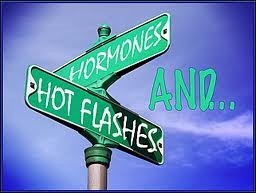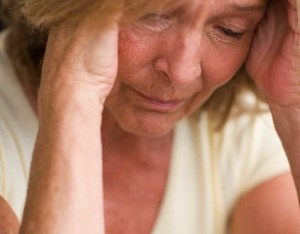Aging and lack of hormones matter, not evolution. Recently a story went through the media regarding the findings of a research group from McMaster University, Hamilton/Ont. that described that as men were dating younger women evolution took fertility away from aging women. It sounds to me that this research, which included computer modelling was mainly driven by sociological observations. Some older males may seek out female partners that have the same age as their daughters, which seems to be considered “socially acceptable”. Contrary to that successful relationships of older females with younger partners are often met with less tolerance!
Hormones are important for behaviors
It seems that medical facts like hormonal changes that are behind behaviors have not been taken into account. The following blog provides you with a background of hormonal changes for both sexes as we age. I also describes how to reset the clock for males and females alike to an age between 30 and 35, which creates a “level playing field”. It is a 101 on bio-identical hormone replacement.
Depleting hormones due to aging
Both men and women experience a slow decrease in hormone production beyond the age of 30, but the depletion occurs somewhat faster in women than in men. As a result women get menopause at the age of 45 to 55 (cessation of periods and postmenopausal symptoms) and men get into andropause (the male equivalent of menopause) at the age of 55 to 65. The main symptom of andropause is erectile dysfunction. These are acceptable simple physiological facts that endocrinologists knew since the 1950’s to 1960’s. Common sense would suggest that replacing missing hormones with bioidentical hormones should bring the body chemistry back to normal. However, this is not what conventional medicine has done.
Synthetic hormones are not bioidentical hormones
Instead, Big Pharma got wind of how powerful hormones were, and they developed hormone-like substances that could be patented and produced on a large scale. What they did not disclose initially was the fact that non-bioidentical hormones with side-chains and chlorine or fluoride atoms in the molecules would cause heart attacks, strokes and blood clots. An example of this is Premarin, an estrogen concoction that is derived from pregnant mares and Provera, a “progesterone-unlike” synthetic product, both of which were used for HRT (“hormone replacement therapy”).
Results of the Women’s Health Initiative (using synthetic hormones)
As there were conflicting reports about the benefit of hormone replacement after menopause in the medical literature, the National Institutes of Health funded a large study (the Women’s Health Initiative) to clarify what was going on with regard to side effects and effects of HRT. Unfortunately, the researchers used synthetic non-bioidentical hormone products in these studies (Premarin and Provera) instead of bioidentical estrogen and progesterone. The results of the Women’s Health Initiative were devastating. In 2002 doctors were warned that Premarin and Provera used as HRT would cause increased heart attack rates and breasts cancer, which led to premature death.
Results of the Women’s Health Initiative confused hormone therapy
Overall, the placebo group did better than the experimental group and this is why the trial was prematurely stopped. Due the wide publicity regarding the negative results of the Women’s Health Initiative postmenopausal women feel confusion about what to do. Either they do not see their physician for hormone replacement. Or conventional doctors advise them that they should use only small amounts of Premarin. Their physician also tells them not to take HRT for more than 5 years for fear that it may cause breast cancer. Medico-legal considerations are at play and the whole issue of HRT after menopause has been politicized.
Facts about bioidentical hormone replacement therapy (BHRT)
The key with menopause or andropause is to accurately determine what the hormone levels are, which requires saliva hormone tests, not blood tests. The results are compared to what is normal for a 30- to 35-year-old person and missing hormones are replaced with bio-identical hormones as originally suggested by Dr. John Lee some time ago. Briefly, he mentioned 3 fundamental rules in bioidentical hormone replacement: first, only replace those hormones that are missing; secondly, use bioidentical hormones instead of synthetic hormones and thirdly, use the smaller doses that are enough to replace the normal hormone levels that the body had around your mid-thirties, don’t over treat. He also stated that there is a need to address lifestyle issues like poor diets, excessive alcohol intake, stress and insulin resistance (from obesity). His recommendations are still valid today, as hormone facts have not changed.
Replace hormones that are missing with bioidentical hormones
So, the physician or naturopath needs to use common sense and replace what is missing with bio-identical hormones (not with synthetic hormone-like drugs that make the patient sick). If people do this properly, a normal sex life persists in both males and females and both age at a much slower pace without the development of heart attacks, strokes or osteoporosis. When people rebalance hormones, adopt a proper diet and do regular exercises, diseases like diabetes, cancer, osteoporosis, heart attacks, strokes, arthritis or high blood pressure do not develop. In other words, this is a way to prevent disabilities and you are able to enjoy an active life in vibrant health.
More info on bioidentical hormone replacement
Eventually all of us, male or female succumb to the hormone deficiencies that come with aging. As long as males still produce testosterone, males will have a normal sex drive. But 10 or 20 years beyond the point where their partners entered menopause erectile dysfunction will eventually set in. Just taking Viagra is no substitute for the missing testosterone and other hormones. If we do not pay attention to hormone restoration, the biological clock is ticking and the diseases I mentioned above will start to occur and lead to premature death. On the other hand with male hormone restoration (bioidentical testosterone) the body chemistry and physiological functions return to how they were in his 30’s. The same is true for female hormone restoration (using estriol/estradiol and progesterone).
Bioidentical hormone replacement in Europe
The irony is that a small number of physicians back in the 1960’s and 1970’s in Europe used bioidentical hormone replacement. It was amazingly successful. One of these doctors is Dr. Hertoghe, an endocrinologist in Belgium. They were able to show then that women could regain their sexual desire and their vitality with bioidentical hormone replacement (BHRT). For some reason (could it be greed?) Big Pharma and various government agencies were able to get the upper hand and suppress this knowledge. They spread the word that hormones that come factories would be of “higher quality” than bioidentical hormone creams from compounding pharmacies. Fortunately, these lies have been exposed in numerous publications and the information is now more easily accessible through the use of the Internet.
Safety of bioidentical hormones
But Big Pharma still tries to intimidate and twist the truth! Here is a recently published prospective study over 3 years involving 300 women from Texas (Women’s Wellness Center, Tyler, Texas, USA) that showed anti-inflammatory effects and anti-anxiety effects with bioidentical hormone replacement. It also showed that no biochemical changes took place that would have caused changes in fibrinogen levels. Bioidentical hormones do not affect clotting, do not cause inflammation, heart attacks cancer. This confirms what Moskowitz had stated in 2006 about the safety of bioidentical hormones.
Testosterone is mostly bioidentical
Male testosterone products from Big Pharma are by and large hormone preparations that are actually bioidentical testosterone. It is with women’s hormones that Big Pharma made substantial chemical modifications so that the final products did not fit the estrogen and progesterone receptors, causing heart attacks, blood clots and breast cancer.
Bioidentical hormone replacement and saliva hormone tests
Both women and men should get a saliva hormone panel test measuring DHEA-S (storage form of DHEA), estradiol, testosterone, progesterone and cortisol from one sample test tube when they become hormone deficient. Typically, the physician should test women first around the age of 35 to 40. Similarly, a man needs testing around the age of 45 to 55. This provides a baseline hormone level. The treating physician or naturopath can then decide, whether bioidentical hormone replacement is necessary. If so, only what is missing is replaced with bioidentical hormone creams from a compounding pharmacy. The hormone levels are titrated to the level around the age of 30 to 35. Thi is according to the principles by Dr. Lee. For A4M physicians this is a routine that is familiar. Your regular physician will likely feel uncomfortable, but many naturopaths will feel very comfortable doing this.
Discussion of the evolutionary study of McMaster University
It may sound intriguing to rationalize that older men like to date and marry younger women. In my medical opinion these researchers got it wrong. Hormone weaknesses manifest themselves perhaps 10 years later in men than in women. In some men testosterone production may even diminish only 20 years later. Older men may not find a sex partner the same age, if women do not use bioidentical hormone replacement. The McMaster team should have done their research including a control group.
Older women on bioidentical hormone replacement preserve their sex drive
This group should consist of men and women who used bioidentical hormone replacement. Researchers likely would notice that older women preserve their sex drive with bioidentical hormones. The sex drive of these older women would be comparable to women in their 30’s. Also, the “aging clock” would have slowed down in these women on bioidentical hormone replacement. This in turn would probably have resulted in a different behavior pattern among the older males.
References
1. Why choose bioidentical hormones: http://www.empowher.com/menopause/content/bioidentical-hormones-vs-synthetic-hormones-what-s-difference
2. Anti-Aging Medicine for Women and Men: http://www.nethealthbook.com/articles/antiagingforwomenandmen.php
3. Menopause: http://www.nethealthbook.com/articles/menopause.php
4. Andropause: http://www.nethealthbook.com/articles/malemenopauseandropause.php
5. 2009 Postgraduate Medicine article on the bioidentical hormone debate: http://www.ncbi.nlm.nih.gov/pubmed/19179815
Last edited June 29, 2013









